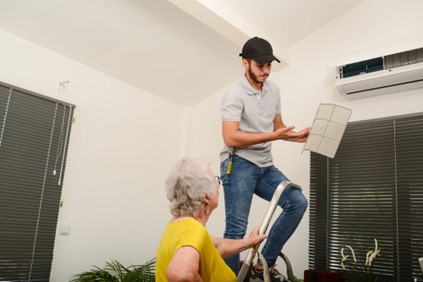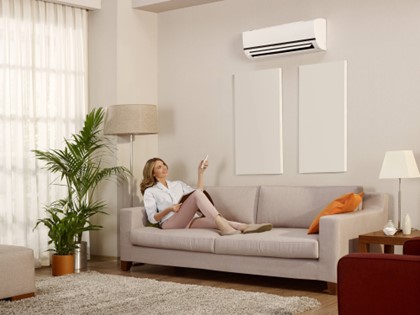
How HVAC Systems Can Relieve Indoor Allergies in Salem, OR
If you have allergies, finding relief from your symptoms is a daily challenge. Fortunately, your heating, ventilation, and air conditioning system can minimize your exposure to allergens and improve the air quality in your home. From proper filtration to humidity control, leveraging the right HVAC features and following recommended best practices can make your home a haven from allergy triggers.
Common Indoor Allergens & Irritants
At first, indoor air may seem cleaner than outdoor air. But while car exhaust, wildfire smoke, and plant pollen may trigger asthma and allergies outside, indoor air harbors more irritants than you may realize. In fact, the Environmental Protection Agency (EPA) says the concentrations of some pollutants are two to five times higher inside than outside your home! Here are some common culprits:
- Dust particles are ubiquitous in homes, containing a mix of fibers, pollen, skin cells, and other microscopic debris. When disturbed, dust becomes airborne and easily inhaled, leading to sneezing, coughing, and allergic reactions.
- Pet dander consists of tiny flakes of skin shed by cats, dogs, and other animals with fur or feathers. These flakes are lightweight and can remain suspended in the air for long periods, exacerbating allergy symptoms.
- Pollen from trees, grass, and weeds are outdoor allergens, but they can easily enter your home through open windows and doors or be carried inside on clothing and shoes. Once inside, pollen can settle on surfaces and linger in the air, worsening your seasonal allergy symptoms.
- Mold thrives in damp environments, and spores can easily become airborne. Inhaling mold spores can cause respiratory issues, especially for individuals with mold allergies, asthma, or lung conditions.
- Volatile organic compounds (VOCs) are chemicals that evaporate into the air from products like paints, cleaning supplies, and building materials. These compounds irritate the respiratory system and contribute to indoor air pollution.
HVAC Features That Help Combat Allergies
Modern HVAC systems offer several features and add-ons to improve indoor air quality and reduce allergens. Consider some of the most popular options you may want to add to your home:
- An air filter is the first line of defense against allergens. Filter efficiency is measured by its minimum efficiency reporting value (MERV) rating. Higher-rated versions, like HEPA filters, trap up to 99.97% of particles as small as 0.3 microns, including dust, pollen, and mold spores. However, it’s important to balance filtration efficiency with adequate airflow, so make sure your HVAC system is compatible before installing a HEPA filter.
- An air purifier integrated with your HVAC system can capture and neutralize a wide range of airborne contaminants, including dust, pollen, pet dander, and even bacteria and viruses. Advanced models use technologies like UV light and ionization to kill or deactivate harmful particles.
- A heat or energy recovery ventilator (HRV/ERV) improves indoor air quality by exchanging stale indoor air with fresh outdoor air. At the same time, it recovers heat and humidity from the outgoing air. This process reduces the concentration of allergens like dust and pollen without noticeably increasing your heating or cooling costs.
- A whole-home humidifier works in tandem with your HVAC system to maintain an optimal humidity range between 30% and 50%. This reduces mold growth and dust mite populations, both of which thrive in high-humidity environments.
Best Practices for Cleaner Indoor Air
Regular HVAC maintenance and mindful practices are effective at reducing indoor allergens. Here’s what to do:
- Invest in a high-quality air filter with a suitable MERV rating for your system. Consult a professional for help selecting a filter that balances allergen removal with sustained airflow.
- Replace your filter regularly. A dirty filter reduces HVAC system efficiency and is less effective at trapping allergens. Depending on your filter type and household conditions, plan to replace it every one to three months.
- Clean your ductwork occasionally. Over time, dust, mold, and other debris accumulate in your ductwork, circulating allergens throughout your home every time the furnace or air conditioner runs. Schedule regular air duct cleaning to remove these contaminants and maintain good indoor air quality.
- Use a humidifier in the winter and a dehumidifier in the summer to keep your home’s relative humidity within the ideal range. This not only keeps dust mites and mold growth at bay but promotes comfort by reducing static electricity in the winter and that cool-but-clammy feeling in the summer.
Adjusting for Seasonal Allergies
Seasonal changes often bring a surge in allergy symptoms, but your HVAC system can mitigate the impact. Follow these tips based on the time of year:
- During the warmer spring and summer months, keep the windows closed when pollen counts are high. Equip your HVAC system with a high efficiency filter, and consider using an air purifier to capture pollen and other airborne particles before they circulate throughout your home.
- As temperatures drop in the fall, the likelihood of mold increases, especially in damp areas. Regularly check and clean areas prone to high humidity, such as basements and bathrooms, and run your dehumidifier to keep moisture in check.
- In the winter, when windows and doors are closed for long periods, indoor allergens like dust and pet dander become more concentrated. Run your HVAC system with an HRV or ERV to maintain indoor air quality during these months. A whole-house humidifier also reduces the transmission rate of bacteria and viruses for a healthier home.
Get Help Relieving Allergies at Home
Nothing is more important than maintaining a healthy home environment, especially if you have allergies. At Advantage Heating & Air Conditioning, we can help you create a healthier home with indoor air quality solutions tailored to your needs. With over 30 years of experience serving the Willamette Valley, we’re committed to providing superior customer service and high-quality work at cost-effective prices. Whether you need to install an air purifier or have your air ducts cleaned, our knowledgeable technicians are here to help. Contact us today with any questions you have or to schedule services in Salem, OR, and the surrounding area. Your comfort and satisfaction are guaranteed!








